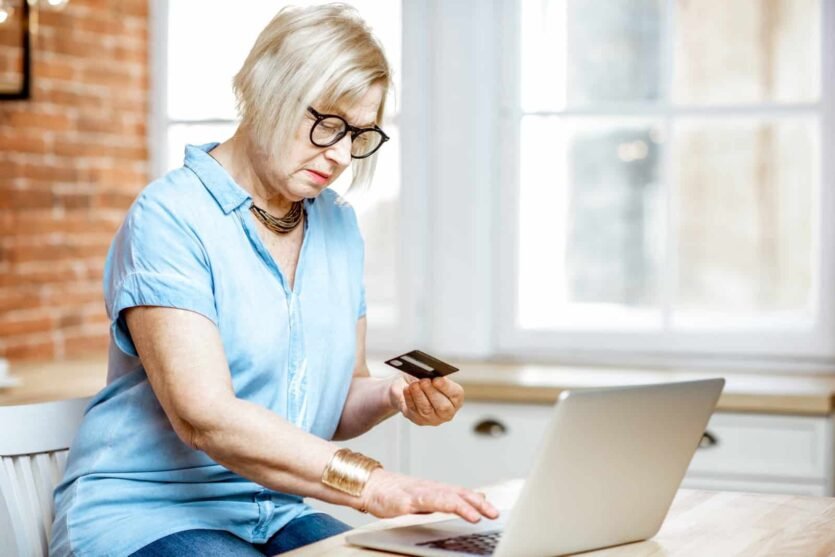How to Protect Yourself from Facebook Marketplace Scams

We may earn a small fee from the companies mentioned in this post.
Have you ever browsed through the enticing listings on Facebook Marketplace, only to wonder if that too-good-to-be-true deal could be a scam? With the ever-growing popularity of online marketplaces, scams have also become increasingly prevalent.
But worry not, this comprehensive guide will help you navigate the world of Facebook Marketplace with confidence and avoid falling victim to scams lurking in the shadows.
In this blog post, we’ll unveil the common Facebook Marketplace scams targeting both buyers and sellers, identify red flags, discuss safe payment practices, and provide tips to keep you safe in your buying and selling endeavours.
By the end of this post, you’ll be equipped with the knowledge to make secure transactions on Facebook Marketplace and enjoy the benefits of this thriving virtual marketplace.
Key takeaways
Understand common Facebook Marketplace scams and recognise red flags to protect yourself.
Adopt safe payment practices such as using secure platforms, avoiding advance payments/deposits, and making simultaneous exchanges of money & goods.
Verify buyer profiles, use secure shipping practices & handle returns professionally to avoid seller scams. Report any suspicious activity on the platform.
Understanding Facebook Marketplace scams

Facebook Marketplace has become a popular platform for buying and selling items, but with its popularity comes the risk of encountering common Facebook Marketplace scams. One such example is the Facebook Marketplace scam, where scammers are lurking on the Facebook platform, Marketplace, ready to prey on unsuspecting buyers and sellers with their devious tactics. These scams can include:
Counterfeit goods
Non-delivery of purchased items
Phishing scams targeting Facebook accounts
Identity theft
It’s important to be cautious and vigilant when using Facebook Marketplace to protect yourself from facebook scammers and their scams.
There are two primary categories of scams on Facebook Marketplace: buyer-targeted and seller-targeted. Understanding the common scams and the tactics employed by scammers is a key step in safeguarding both yourself and your hard-earned money.
We will further examine these two categories, illuminating the darker aspects of Facebook Marketplace.
Buyer-targeted scams
Buyers on Facebook Marketplace are often the target of scams, as fraudsters exploit their eagerness to score a great deal. Some of the most prevalent scams that buyers may encounter include fake giveaways and fraudulent transactions with fake buyers, such as:
Fraudulent goods: Counterfeit or faulty products are commonly sold at lower prices, luring buyers into a false sense of security and leaving them with worthless items.
Non-delivery of items: Scammers take payment but never ship the item, leaving buyers empty-handed.
Phishing scams: Scammers trick buyers into sharing sensitive information, such as login credentials, and gain access to their personal accounts.
It’s important for buyers to be cautious and verify the legitimacy of sellers before making any purchases on Facebook Marketplace.
For buyers to fend off these scams, they must approach seemingly too-good-to-be-true deals with caution, thoroughly research both the seller and the product, and demand more information and photos.
Validating the authenticity of high-ticket items such as designer bags or jewellery is of utmost importance, given that these are common targets for scammers seeking a quick profit. By remaining vigilant and taking the necessary precautions, buyers can enjoy a safer shopping experience on Facebook Marketplace.
Seller-targeted scams
Sellers on Facebook Marketplace are not immune to scams either. Popular scams they face include:
Payment and overpayment scams: Scammers pose as buyers and falsely claim to have sent a payment, often using counterfeit cheques or fraudulent payment methods. They may also send an excessive amount and request a refund, leaving the seller with a financial loss.
Returns scams: Buyers return a different or damaged item, causing a loss for the seller.
Phishing scams: Scammers attempt to obtain the seller’s sensitive information.
To protect themselves, sellers should verify buyer profiles, be cautious of unusual communication requests, and use secure shipping practices. Handling return requests and disputes professionally can help avoid falling victim to scams. Sellers who are proactive and adopt these safeguards can maintain a higher level of safety when conducting transactions on Facebook Marketplace.
Checkout our informative blogpost on protecting yourself from Vinted scams
Identifying red flags on Facebook Marketplace

Identifying red flags plays a pivotal role in evading scams on Facebook Marketplace. Some of the most common warning signs include suspicious profiles, fake listings, inconsistent pricing and listing details, and unusual communication requests.
By being aware of these red flags, you can steer clear of potential scams and have a more secure experience on the platform.
If you come across a listing that arouses suspicion, trusting your instincts and scrutinizing the details is a must. If something feels off, it’s better to err on the side of caution and avoid the transaction. We will further examine these warning signs to assist you in recognizing potential scams and maintaining your safety on Facebook Marketplace.
Suspicious profiles
One of the first red flags to look for when buying or selling on Facebook Marketplace is a suspicious Facebook profile. Fake or fraudulent profiles may lack a profile picture, have a limited number of friends, or be newly created. Scammers often use these profiles to commit fraud and avoid detection, so it’s essential to scrutinise the buyer or seller’s Facebook profile before engaging in a transaction.
When verifying a profile, pay close attention to the user’s activity and reviews from other buyers or sellers. If you notice any inconsistencies or dubious activity, it’s best to avoid the transaction and report the profile. Proactively identifying suspicious profiles is an effective way to shield yourself from scams on Facebook Marketplace.
Inconsistent pricing and listing details
Another red flag to watch out for is inconsistent pricing and listing details on malicious websites. Scammers may use misleading pricing to attract potential buyers, only to change the price or provide incorrect information about the item’s condition or specifications.
In some cases, they may even list a low-ticket item to draw attention, then attempt to sell a more expensive product or the same product at a higher price.
To avoid falling victim to scams involving inconsistent pricing and listing details, be sure to compare prices and research similar items on Facebook Marketplace. If a price seems too good to be true, proceed with caution and ask for additional information or photos to verify the authenticity of the listing.
Unusual communication requests
Unusual communication requests can also be a red flag on Facebook Marketplace. Scammers often try to move conversations off of the social media platform, to avoid detection and gain access to your personal information.
For example, they may insist on communicating via email, text message, or a Google Voice number, instead of using Facebook’s internal messaging system.
To stay safe on Facebook Marketplace, follow these guidelines:
Insist on communicating through Facebook and avoid sharing your personal information or sensitive data with strangers.
If a seller or buyer seems insistent on moving the conversation off the platform, be cautious and consider reporting them to Facebook Marketplace.
By remaining vigilant and maintaining communication within the platform, you can protect yourself from scams.
Safe payment practices on Facebook Marketplace

Ensuring safe payment practices is vital when buying or selling on Facebook Marketplace. Using reputable payment platforms, avoiding advance payments or deposits, and making simultaneous exchanges of money and goods can help protect you from scams and ensure a secure transaction.
Adopting these precautions and understanding the risks tied to different payment methods can contribute to a more secure experience on Facebook Marketplace. We will delve into these secure payment practices, including Facebook Checkout, in greater detail to enable you to make well-informed decisions during your transactions on the platform.
Reputable payment platforms
Using secure and reputable payment platforms like PayPal when buying or selling on Facebook Marketplace is crucial for protecting yourself from scams.
These platforms offer buyer and seller protection, ensuring that you can recover your money in case of a scam or fraudulent transaction. When using PayPal, opt for the ‘goods and services’ option, as this provides buyer protection and allows you to dispute transactions if necessary. Other reputable payment platforms include:
Google Pay
Apple Pay
Venmo
Zelle
Opting for secure payment methods, such as using a bank account, and steering clear of riskier options such as wire transfers and cash transactions, will decrease your chances of becoming a scam victim on Facebook Marketplace.
Avoiding advance payments and deposits
Advance payments and deposits are another area where scams can occur on Facebook Marketplace. Scammers may ask for payment in advance to “secure” an item or request a deposit before providing the product or service. In both cases, the scammer may have no intention of delivering the item or fulfilling their end of the deal to receive payment.
To avoid scams involving advance payments or deposits, it’s crucial to follow on screen instructions and:
Research the seller and product
Request additional information and photos
Verify tickets, rentals, and high-value items
Refrain from making any payments or deposits until you have signed the appropriate paperwork or received the item in person.
Simultaneous exchange of money and goods
When buying or selling on Facebook Marketplace, it’s essential to ensure a simultaneous exchange of money and goods. This means that the payment and item should be exchanged at the same time, either in person or through a secure delivery method.
By doing so, you can avoid scams where the buyer or seller takes the money or item without fulfilling their end of the deal.
When exchanging money and goods simultaneously, follow these tips to ensure a safe transaction on Facebook Marketplace:
Meet in a public place.
Bring a companion.
Inspect the item before handing over the payment.
Utilise a secure payment method like a credit card or PayPal.
By following these tips and ensuring a simultaneous exchange of money and goods, you can protect yourself from scams and enjoy a secure experience on Facebook Marketplace.
Tips for buyers to avoid scams

Armed with the knowledge of common scams and red flags, buyers can take additional steps to protect themselves on Facebook Marketplace. Here are some tips:
Research sellers and products before making a purchase.
Request additional information and photos from the seller to ensure the item is as described.
Verify tickets, rentals, and high-value items before making a payment. By following these steps, buyers can avoid scams and make informed purchasing decisions.
Buyers who take a proactive approach and follow these tips can experience a safer shopping journey on Facebook Marketplace while exploring the extensive range of items available. We will further examine these tips and their effectiveness in helping buyers evade scams.
Researching sellers and products
Researching sellers and products is an essential step for buyers to avoid scams on Facebook Marketplace. To do so, follow these steps:
Navigate to the product page.
Click on the seller’s name under Seller information.
This will provide you with access to the seller’s profile.
Scrutinise their activity and reviews from other buyers or sellers.
By researching similar items and comparing prices, you can gain a better understanding of the market and identify potential scams. If a seller or product raises suspicions, ask for additional information or photos to verify the authenticity of the listing.
Investing time in researching sellers and products is a strategy that can shield you from scams and aid you in making well-informed decisions when purchasing on Facebook Marketplace.
Requesting additional information and photos
Asking for more information and photos is another crucial step for buyers to ensure the legitimacy of a listing on Facebook Marketplace. When inquiring about an item, don’t hesitate to ask the seller for additional photos, specifications, or proof of authenticity. This can help you verify the condition and legitimacy of the item before making a purchase.
If a seller is hesitant to provide additional information, proceed with caution and consider reporting the listing to Facebook. By requesting more information, you can avoid scams and ensure a safer shopping experience on Facebook Marketplace.
Verifying tickets, rentals, and high-value items
When purchasing tickets, rentals, or high-value items on Facebook Marketplace, it’s essential to verify their authenticity before making a purchase. For tickets, compare the barcode, serial number, and other details with the seller’s listing.
When considering a rental property, visit the property in person (if possible) or have a trusted individual confirm its existence and condition.
For high-value items, request additional photos and information from the seller, such as a serial number or proof of purchase. By taking these steps, you can ensure the authenticity of tickets, rentals, and high-value items, and avoid falling victim to scams on Facebook Marketplace.
Tips for sellers to avoid scams

Sellers on Facebook Marketplace can also take proactive measures to protect themselves from scams. Here are some tips:
Verify buyer profiles before completing a transaction.
Use secure shipping practices, such as requiring a signature upon delivery or using a trusted shipping service.
Handle return requests and disputes professionally, following Facebook Marketplace’s guidelines. By following these tips, sellers can help prevent scams and ensure a smooth selling experience.
Sellers who incorporate these tips and stay alert to common scams can confidently display their items on Facebook Marketplace, reaping the benefits of this popular platform.
We will delve into these tips further, aiding sellers in evading scams and ensuring the safety of their transactions.
Verifying buyer profiles
To avoid scams when selling on Facebook Marketplace, it’s essential to verify the legitimacy of buyer report seller profiles. Inspect the buyer’s profile for any dubious activity, such as multiple accounts or reviews from other sellers.
You can also request additional information, such as government-issued ID or proof of address, to further verify the buyer’s identity.
Sellers who invest time in verifying buyer profiles, including checking if they have a Google Voice account, can guard themselves against scams and promote a secure selling environment on Facebook Marketplace.
Secure shipping practices
Ensuring secure shipping practices is vital when selling items on Facebook Marketplace. Here are some steps to follow:
Ship the item within three business days of confirming the order.
Mark the item as shipped and enter a tracking number.
Consider using guarenteed delivery options for eligible items.
Package the item securely to ensure safe arrival.
Connect a PayPal account to facilitate secure payment.
By following these secure shipping practices, sellers can minimise the risk of scams and provide a positive experience for their buyers, making Facebook Marketplace safe to use.
Handling return requests and disputes
Handling return requests and disputes professionally is crucial for sellers to avoid falling victim to scams. Initially, contact the buyer to discuss the issue and try to reach an agreement. If the buyer remains dissatisfied, offer a refund or exchange.
In cases where a resolution cannot be reached, contact Facebook Marketplace customer service for assistance. By addressing disputes amicably and professionally, sellers can maintain their reputation and avoid scams on Facebook Marketplace.
Protect yourself from the “Immediate Connect Scams”, read our informative blogpost.
Reporting scams on Facebook Marketplace

If you suspect that you’ve been scammed on Facebook Marketplace, it’s paramount that you immediately report it to the platform. This can help Facebook take action against the scammer and protect other users from falling victim to the same scam. After reporting a scam, take precautionary measures to safeguard your personal data and bank accounts.
Beyond contacting Facebook, it’s vital to local police, Action Fraud (UK) and inform your bank if you’ve divulged any sensitive financial information to the scammer. By reporting scams and taking steps to protect yourself, you can contribute to a safer community on Facebook Marketplace.
Summary
Navigating the world of Facebook Marketplace can be a rewarding experience, but it’s essential to remain vigilant and protect yourself from scams.
By understanding common scams targeting both buyers and sellers, identifying red flags, practicing safe payment methods, and implementing tips to avoid scams, you can confidently buy and sell on Facebook Marketplace.
As you venture into the vast array of items available on Facebook Marketplace, remember to trust your instincts, research sellers and products, verify the authenticity of high-value items, and report any suspicious activity.
By doing so, you can enjoy a safer and more secure shopping experience on Facebook Marketplace.
Frequently Asked Questions
How to know if a buyer is scamming you on Facebook Marketplace?
Be cautious of buyers offering suspiciously low prices for high-ticket items, refusing to meet in person, trying to move the conversation outside Facebook Messenger, sending you prepaid shipping labels, or overpaying for a product as these are all red flags for potential Facebook Marketplace scams.
What Facebook Marketplace scams are there?
Be wary of Facebook Marketplace scams, such as fake giveaways, bait-and-switch items, requests for payment in gift cards, counterfeit products, faulty products, fake house rentals and car rental scams and deposit/advance payment scams.
What can a scammer do with your phone number on Facebook Marketplace?
A scammer can create a Google Voice number linked to the seller’s phone number, gaining access after the seller sends a verification code. This allows the scammer to utilize the victim’s phone number to hide their true or even identity theft.
How can I identify a fake or suspicious profile on Facebook Marketplace?
Check for a profile picture, the number of friends, and account creation date when evaluating profiles on Facebook Marketplace to identify potential fake or suspicious accounts.
What are some red flags to look for when buying or selling on Facebook Marketplace?
Look out for suspicious profiles, inconsistent pricing and listing of payment details, and any unusual communication requests when buying or selling on Facebook Marketplace as these may be red flags.
Useful external reference websites
1. Action Fraud (Police)
- Website: Action Fraud
- Usefulness: Provides details on the latest scams and fraud risks, including online scams.
2. Citizens Advice
- Website: Citizens Advice
- Usefulness: Consumer advice including online scams and marketplace frauds.
3. The Financial Conduct Authority (FCA)
- Website: FCA
- Usefulness: Information on financial scams including online marketplace scams.
4. Trading Standards
- Website: Trading Standards
- Usefulness: Consumer protection information including insights on scams.
5. Cyber Aware (NCSC)
- Website: Cyber Aware
- Usefulness: Offers advice on how to stay secure online, covering various types of online scams.
6. Age UK
- Website: Age UK
- Usefulness: Offers information targeting the elderly, but applicable to all, on how to avoid scams, including online marketplace scams.
7. The Metropolitan Police – Fraud Alert
- Website: Fraud Alert
- Usefulness: Provides information on various scams, including those happening in online marketplaces.
With over three decades of experience in the heart of London’s financial sector, I have dedicated my career to the pursuit of robust cybersecurity practices and IT leadership. As a Certified Information Systems Security Professional (CISSP), Certified Information Security Manager (CISM), Certified Chief Information Security Officer (C|CISO), Certified Ethical Hacker (CEH), and Computer Hacking Forensic Investigator (CHFI), I bring a wealth of knowledge and expertise to the table.
My journey in the field of cybersecurity has not only been about personal growth but also about sharing my insights with others. As an international speaker, I have had the privilege of addressing audiences worldwide, discussing the importance of cybersecurity in today’s digital age. My passion for knowledge sharing extends to my work as an author and blogger, where I delve into the complexities of cybersecurity, offering practical advice and thought leadership.
In my role as a CISO and Head of IT, I have overseen the development and implementation of comprehensive information security and IT strategies. My focus has always been on creating resilient systems capable of withstanding the evolving landscape of cyber threats.
My Master’s degree in Cybersecurity has provided a solid academic foundation, which, when combined with my practical experience, allows me to approach cybersecurity from a holistic perspective.
I am always open to connecting with other professionals in the field, sharing knowledge, and exploring new opportunities. Let’s secure the digital world together.

